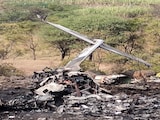Street battles raged Thursday near a hospital in besieged Gaza, where the dire humanitarian crisis and surging death count have caused tensions between Israel and top ally the United States.
Israeli Prime Minister Benjamin Netanyahu appeared to be trying to soothe a rift with US President Joe Biden with plans to send a government delegation to Washington after earlier cancelling the trip.
"The prime minister's office has said they'd like to reschedule the meeting," said a US senior administration official, speaking on condition of anonymity and adding that they were setting a new date.
Tensions flared after Washington on Monday allowed the UN Security Council to pass its first-ever resolution calling for an "immediate ceasefire" and hostage release in Gaza by abstaining from the vote.
Netanyahu charged that the step by the United States, which had vetoed previous similar demands, served to embolden Israel's enemy Hamas whose October 7 attack sparked the deadliest ever Gaza war.
As truce talks in Qatar also appeared to have ground to a deadlock for now, heavy fighting and sustained bombardment again rocked Gaza in the nearly six-month-old war.
The army reported heavy fighting near the Al-Amal Hospital in Gaza's main southern city of Khan Yunis in which its troops had killed dozens of militants and recovered hundreds of weapons.
Across Gaza, Israel's military said it had struck dozens of targets over the previous day while the health ministry in the Hamas-run territory reported 62 more deaths.
'Decomposing bodies'
Israel says Hamas and Islamic Jihad operatives have fought from inside Gaza hospitals, using patients, medical staff and displaced people for cover -- charges the Palestinian groups have denied.
Israel said its soldiers near Al-Amal had launched "targeted raids on terrorist infrastructure ... and are eliminating dozens of terrorists using precise fire in close-quarters combat and with air support".
They had also "apprehended dozens of terrorists in the area who were transferred for interrogations", the army added.
Israeli tanks and armoured vehicles have also massed around another Khan Yunis health facility, the Nasser Hospital, but had not yet staged a full-scale raid, the Gaza health ministry said.
Fighting has also rocked the Gaza City district around Al-Shifa Hospital, the territory's biggest, where the army says it has killed around 200 militants since early last week.
Local resident Karam Ayman Hathat, 57, said that during the battles "explosions caused the building to shake" and that he had witnessed Israeli troops arrest several men.
"Israeli forces forced the men to strip down to their underwear," he said. "I saw others blindfolded and ordered to follow a tank amid explosions around them."
Another man from the neighbourhood, Abed Radwan, 63, said he had to flee when "Israeli forces stormed all buildings and homes in the Al-Rimal area, arrested several people, and forced the rest to walk south".
"I walked with them," he said. "I saw many decomposing bodies in the streets and several houses flattened. They left nothing intact, they destroyed everything."
Famine 'ever closer'
The war began with Hamas's October 7 attack that resulted in about 1,160 deaths in Israel, mostly civilians, according to an AFP tally based on Israeli official figures.
The militants also took about 250 hostages. Israel says about 130 captives remain in Gaza, including 34 presumed dead.
Israel's retaliatory campaign has killed at least 32,552 people, mostly women and children, according to the health ministry in Hamas-run Gaza.
While the war has turned much of the territory into a devastated wasteland of collapsed buildings and tank tracks, Israel has also imposed a siege on its 2.4 million people, eased only by occasional aid deliveries.
The United Nations has warned that famine "is ever closer to becoming a reality in northern Gaza," and said Gaza's health system is collapsing "due to ongoing hostilities and access constraints".
With clean water also scarce, Gazans were queueing to fill plastic containers from a tank west of Rafah city.
"We have to queue for everything," said one displaced woman, Maram Abu Amra. "We walk for an hour in total. Sometimes, we return empty-handed, without water."
Talks on Rafah plan
US concern has mounted over Israeli plans to push its ground offensive into Rafah, Gaza's southernmost city which is packed with some 1.5 million people, many of them displaced from other parts of the territory.
The city is already under regular bombardment, which on Wednesday left its al-Kuwaiti Hospital coping with the wounded and the dead.
A motorcycle cart roared up with a man lying motionless in the back, his trousers soaked with blood.
US officials say they want to present Israel with an alternative plan for Rafah, focused on striking Hamas targets while limiting the civilian count.
Israeli Defence Minister Yoav Gallant had "constructive discussions" in Washington over the past two days, a US official said.
"Rafah was one of the many topics discussed," in the talks, the official added.
Washington has also raised the issue of how Gaza will be ruled after the war and has suggested a future role for a reformed Palestinian Authority, the body which exercises limited powers in parts of the Israeli-occupied West Bank.
On Thursday, Palestinian president Mahmud Abbas approved the new government of prime minister Mohammed Mustafa.
Mustafa said his cabinet "will work on formulating visions to reunify the institutions, including assuming responsibility for Gaza".
He said the "top national priority" for the new government, set to take office on Sunday, would be the end of the war in Gaza.
(Except for the headline, this story has not been edited by NDTV staff and is published from a syndicated feed.)















